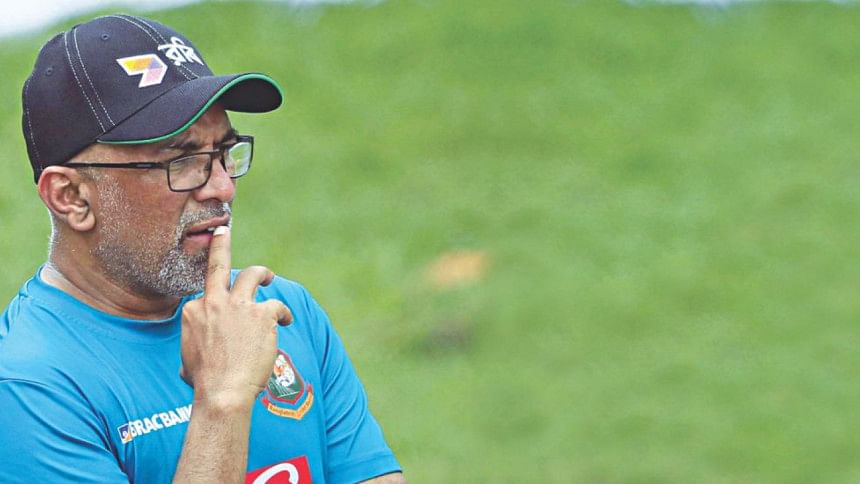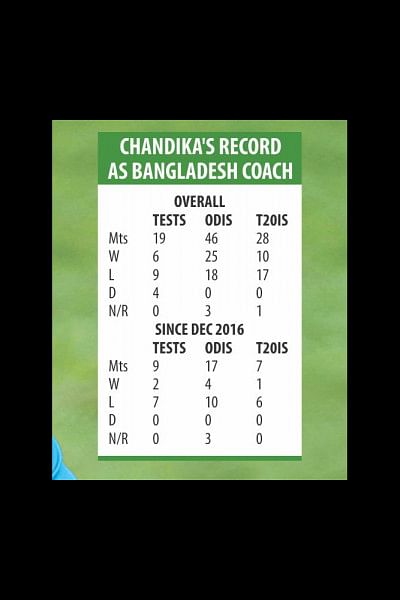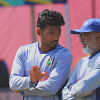A home-made crisis

Although contracted till the 2019 World Cup in England, Bangladesh head coach Chandika Hathurusingha decided midway through the debacle that was the tour of South Africa that he would no longer continue in the post. He intimated this intention through a letter to Bangladesh Cricket Board (BCB) president Nazmul Hassan before the ODI series in South Africa began on October 15. While the BCB boss did say that the reason for his resignation was not yet certain, he heavily hinted that it was negativity in the media that may have influenced the Sri Lankan's decision. However, if one looks at developments over Hathurusingha's tenure, it will seem that the current situation was a consequence of some choices taken by the coach and the board.
Hassan however indicated that the BCB will be flexible to seek a solution. Historically, the end of a Bangladesh coach's tenure has left a bad taste in the mouth more often than not, but while in the past it has been callous management from the BCB, this time it was a dereliction of duty from Hathurusingha in deserting a leaky ship. That Hassan is still hopeful of reconciliation and has not even started looking for a possible replacement at least 20 days after receipt of the letter reveals much about the power balance between the BCB and the coach, which in turn poisoned the chalice for Bangladesh's most successful coach.

"We cannot keep someone who does not want to stay," said Hassan yesterday evening at his Beximco office in a press conference organised after news had broken earlier in the day about Hathurusingha's resignation. "Yes, we will talk to him by November 15 and see what his problem is; and if we can do something about it we will."
The decision on whether or not to fulfil his contract has, therefore, essentially been left up to the coach. Hassan said on numerous occasions that Hathurusingha is a professional, and then in true Hassan fashion also went on to say that this decision was one taken emotionally, before then going on to say that nothing can be known for certain till he talks further with the emotional professional.
Although he was not clear about the reason for Hathurusingha's decision, Hassan tried to shift the blame for it on the treatment meted out to the Sri Lankan by the media and even on the players.
"Maybe I would have done the same thing if I was in his place," said Hassan. "Whether the team is winning or losing, he is being criticised. I think all of you will be happy if he goes -- and perhaps some players too -- but it would have been good if he stayed longer.
"He always used to ask why the players said this or that [in the media], my question is why criticise so much in the first place?"
Meanwhile, Hathurusingha has maintained radio silence since the eve of the first Test against South Africa in Potchefstroom on September 27 as Bangladesh went on to lose all seven international matches on the tour.
"Till now I have not seen much emotion in him, but since he did not tell even me about it, I am saying maybe it was an emotional decision," said Hassan. "Maybe something happened on tour that hurt him -- I don't know. Everyone was happy before the series; we sat together at my house and everyone was happy -- him, Mushfiqur [Rahim], everyone -- and planning for the tour. This is unexpected."
WHERE IT STARTED GOING SOUR
Even beyond Hassan's utterances yesterday, Hathurusingha has been known as someone who does not take criticism lightly, and has on more than one occasion sought out authors of certain negative articles. Being thus thin-skinned, it now seems to have been a serious error on the part of the BCB to include Hathurusingha in the squad selection process. He is a national coach who is not in the country when no international matches are scheduled, so to expect him to be on the cutting edge of discovering new talent is unrealistic, and so it has proven.
Being involved in selecting squads, it is understandable that Hathurusingha was held to account when the team did poorly, as they have done since the New Zealand tour at the turn of the year. But he may not have had all the answers as he did not know the breadth of talent in the country, and it is ethically questionable in that light that the position of selector was made for him and accepted. The over-reliance on the few players who he saw only in pre-series training camps eventually made the talent pool shallower.
Added to that is the clout that Hathurusingha has held in the corridors of power in Mirpur and within the team, and that it has led to some resentment within the setup is an open secret that was let out of the bag by Test skipper Mushfiqur's outburst against the management during the second Test in South Africa.
So the BCB and the coach, by their choices and attitudes, had created an atmosphere which made yesterday's revelations inevitable. Their unprofessional response to their own crisis has left Bangladesh cricket in the lurch once again, and going by trends it is probably not the last time.

 For all latest news, follow The Daily Star's Google News channel.
For all latest news, follow The Daily Star's Google News channel. 








Comments